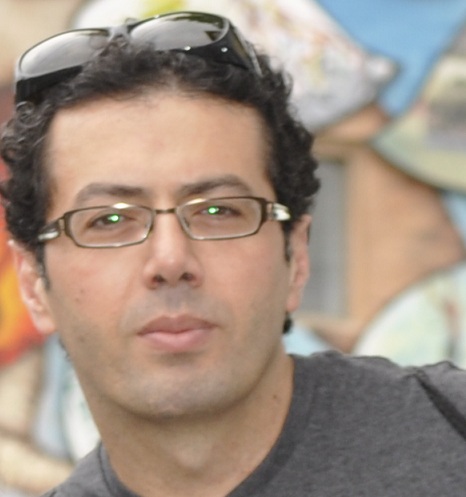www.aljazeerah.info
Opinion Editorials, December 2017
Archives
Mission & Name
Conflict Terminology
Editorials
Gaza Holocaust
Gulf War
Isdood
Islam
News
News Photos
Opinion Editorials
US Foreign Policy (Dr. El-Najjar's Articles)
www.aljazeerah.info
Trump's Decision on Jerusalem: The Entire US-Middle East Political Framework Just Collapsed By Ramzy Baroud Al-Jazeerah, CCUN, December 11, 2017 |
 |
 |
|||
|
***
What Trump Has Done: The Entire US-Middle East Political
Framework Just Collapsed
Now that US President Donald
Trump has fully adopted the Israeli rightwing political discourse on
Palestine, the Palestinian Authority is in a very tough spot.
"I have determined that it is time to officially recognize Jerusalem as
the capital of Israel," Trump said in Washington on Wednesday. The
embattled president has done what many had asked him not to do. But the
truth is, US foreign policy has been bankrupt for years. It was never
fair, nor did it ever intend to be so.
Trump merely pulled the
plug, not only on the so-called peace process, two-state solution,
‘land-for-peace formula’ but also all the other tired clichés that have
been long dead and decomposing.
But Trump’s announcement has
also laid to rest the illusion that the US was ever keen on achieving a
just and lasting peace between Israel and its neighbors.
What is left to be said by those who have placed the Palestinian
national project of liberation on hold for nearly three decades, waiting
for the US to fulfill its self-designated role of an ‘honest peace
broker’?
The Fatah movement of President Mahmoud Abbas declared a
‘day of rage’ in response to Trump’s announcement. Way to deflect
attention from the real crisis at hand: the fact that the PA has
miserably failed by leasing the fate of Palestine to Washington, and, by
extension to Israel as well.
Some are arguing that the two-state
solution is not a US property to keep or give away, and that
Palestinians can continue to advocate what seems to them to be the sane
and possible solution.
However, the unpleasant truth is that
the ‘two-state solution’ in its current form was itself an American
formulation, part of a larger framework that was championed mostly by
the US as it pushed Israelis and Palestinians to the ‘negotiation table’
since the Madrid Talks in 1991.
Surely, there will be others who
will attempt to continue playing that role, but what difference can
Paris and London, for example, make if Tel Aviv and its powerful
Washington benefactors have no interest in the subject whatsoever?
Trump’s announcement should not come as a complete surprise, though.
Between the hasty American withdrawal from Iraq, ‘pivot to Asia’, ‘leading
from behind’ doctrine throughout the so-called ‘Arab Spring’, and
failure to press Israeli Prime Minister Benjamin Netanyahu on freezing
the illegal settlements in Occupied Jerusalem and the West Bank, US
policies were growing bankrupt and futile.
This paved the road
for a new type of thinking, one that moves away from pandering to
Israel, while paying lip service to peace, to wholly embracing the
Israeli political discourse and future outlook.
In fact, Trump’s
recent announcement from Washington was a tamed version of his statement
before the Israel lobby last year.
In March 2016, Republican
presidential candidate Trump delivered his famous speech before the
American Israeli Public Affairs Committee (AIPAC).
Of the many
false claims and dangerous
promises Trump made, a particular passage stood unique, for it
offered early clues to what the future administration’s policy on Israel
and Palestine would look like.
"When the United States stands
with Israel, the chances of peace really rise and rises exponentially.
That’s what will happen when Donald Trump is president of the United
States," he declared.
"We will move the American embassy to the
eternal capital of the Jewish people, Jerusalem," he announced. The
mixed cheers and applause were deafening.
Now that Trump is
president, he inherited a failed Middle East policy from his
predecessor, a policy that Trump finds of no benefit to his
administration. What truly matters to the new president is the support
of the very constituency that brought him to the White House in the
first place. The rightwing, conservative, Christian-evangelical
constituency remains the foundation of his troubled presidency.
So, on December 4, Trump picked
up the phone and began calling Arab leaders, informing them of his
decision to announce a move that has been delayed for many years:
relocating the US embassy from Tel Aviv to Jerusalem.
Arabs
fumed, for such a move would surely create further destabilization in a
region that has been taken on a destructive course for years. Much of
that instability is the outcome of misguided US policies, predicated on
unwarranted wars and blind support for Israel.
Recognizing
Jerusalem as the capital of Israel is the last straw in an ailing
discourse. The US Middle East political framework of the past is
collapsing to the confusion of US allies in the region, and, of course,
the pleasure of Israel.
In fact, Trump’s decision constitutes a
total US
reversal in its approach towards the entire Middle East, considering
that Palestine and Israel have been at the center of most of the
region’s conflicts.
There are factors that made this embassy
move an attractive option for the Trump administration:
The US
is currently experiencing unprecedented political instability. Talks of impeaching the
president are gaining momentum, while his officials are being paraded
before Department of Justice investigators for various accusations,
including collusion with foreign powers.
Under these
circumstances, there is no decision or issue that Trump can approach
without finding himself in a political storm, except one issue, that
being Israel.
Being pro-Israel has historically united the US’s
two main parties, the Congress, mainstream media and many Americans,
lead among them Trump's political base.
Indeed, when the
Congress passed the Jerusalem
Embassy Act in 1995, Trump’s interest in politics was quite
haphazard and entirely personal.
The Congress has gone
even further. Attempting to twist the arm of the White House, it
added a clause, giving the administration till May 1999, to carry out
the Congress's diktats or face a 50 percent cut in the State
Departments’ budget allocated to "Acquisition and Maintenance of
Buildings Abroad."
To avoid violating the Congress’ public law,
and to maintain a thread, however thin, of credibility, every US
president has signed a six-month waiver; a loophole in the law that
allowed the White House to postpone the relocation of the embassy.
Fast forward to Trump's AIPAC speech. His pledge to move the embassy
then seemed merely frivolous and opportunistic.
That was the
wrong assessment, however. Collusion between the Trump's team and Israel
began even before he walked into the Oval House. They worked together
to undermine
UN efforts in December 2016 to pass a resolution condemning Israel’s
continued illegal settlement in the Occupied Territories, including
Jerusalem.
Chosen to lead the ‘peace’ efforts was Trump's
son-in-law and Israeli Prime Minister Benjamin Netanyahu’s good
friend, Jared Kushner. Trump’s dedication
to Israel was clearly not fleeting.
Trump has finally
decided to shed a mask that every US president has worn for decades. And
by doing so, the US will, oddly enough, negate the paradoxical role it
carved for itself in the last 50 years - that of “peacemaker”.
-
Ramzy Baroud is a journalist, author and editor of Palestine Chronicle.
His forthcoming book is ‘The
Last Earth: A Palestinian Story’ (Pluto Press, London). Baroud has a
Ph.D. in Palestine Studies from the University of Exeter and is a
Non-Resident Scholar at Orfalea Center for Global and International
Studies, University of California Santa Barbara. His website is
www.ramzybaroud.net.
***
Share the link of this article with your facebook friends
|
|
|
|
||
|
||||||




